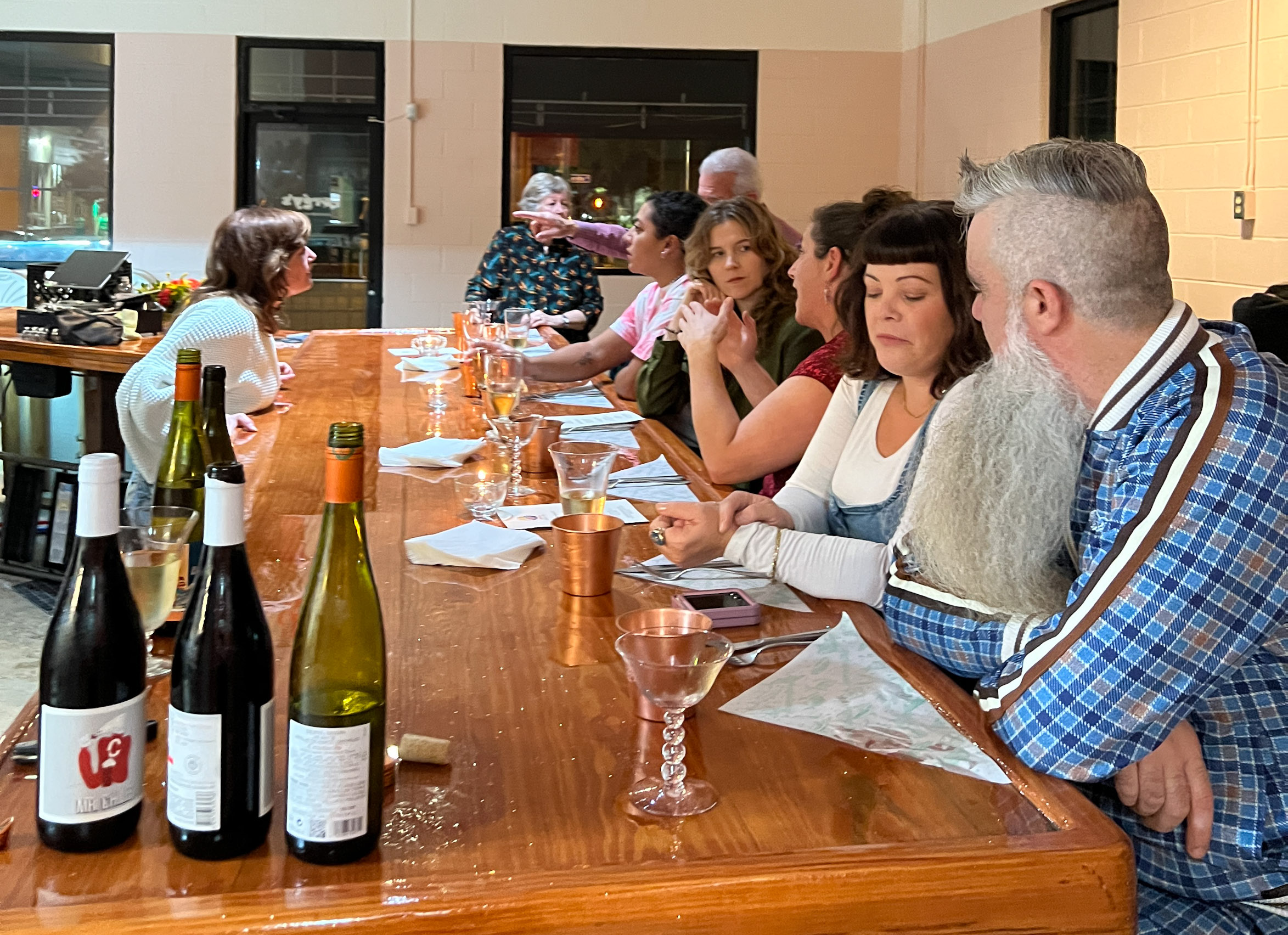Talk about synchronicity. The Slow Fish KNOW FISH Dinner® celebrating local, sustainable seafood caught by Louisiana fish harvesters went down mid-November at a soon-to-be-opened seafood store that will source directly from local fishermen.¹ Porgy’s Seafood Market is a collaboration between Chef Dana Honn of Carmo restaurant and Chef Marcus Jacobs and Caitlin Carney of Seafood Sally’s restaurant.
The idea behind Porgy’s is to provide the community with a broader variety of beautiful, directly sourced seafood at a time when local markets are flooded with cheap, poor-quality imported products. Connecting fishermen in southern parishes struggling to stay afloat and consumers looking for good, locally harvested seafood benefits everyone.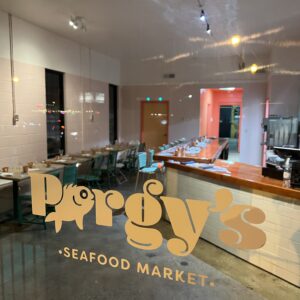
So that was a focus of the evening on Nov. 14. Dana and Marcus set the tone by welcoming everyone into the conversation about building community around locally sourced seafood. Attendees represented a wide range of folks from different cultural and professional backgrounds including chefs, artists, journalists, musicians, and academics.
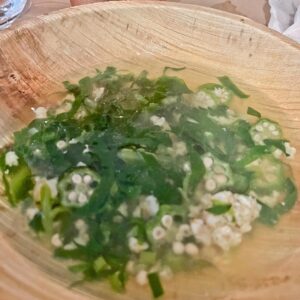
The simple, clean flavors of Sandy’s Vietnamese Shrimp, Spinach and Okra Soup were a perfect start to the evening. Photo: Mara Welton.
The first course was an outstanding Vietnamese soup featuring shrimp, spinach, and okra prepared by Sandy Ha Nguyen of Coastal Communities Consulting. Sandy spoke about her work with CCC supporting Vietnamese and other fishing communities following the BP Oil Spill and hurricanes, as well as market downturns. She and Dana both told their stories at the Slow Fish Chefs Camp hosted by new Dillard University Slow Food chapter the day before the dinner. The soup was a clean, fresh and verdant symphony of local flavors.
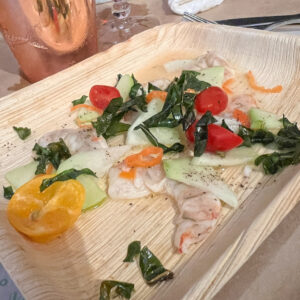
Ceviche: a fresh, briny taste of the Louisiana Gulf coast, courtesy of Chef Dana Honn and Shrimper Lance Nacio. Photo: Mara Welton
As attendees tasted the briny bliss of Louisiana shrimp ceviche, Lance Nacio of Anna Marie Shrimp talked about the shrimp he provided, and the headwinds he and other shrimpers face due to a recent flood of cheap imported shrimp. As a result, dock prices have plummeted from $3 per pound in April of 2022 to less than 60 cents per pound recently, he said.
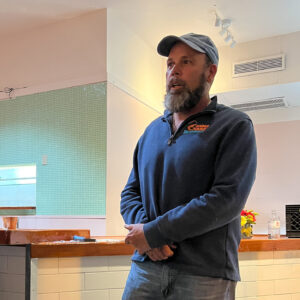
Captain Lance Nacio talks about headwinds in the shrimp industry, and the importance of local supply chains. Photo: Mara Welton
His story prompted discussion about the importance of supporting local fishermen in the face of such market dynamics.
The entrée was grilled Gulf fish (either red snapper collars, Mahi Mahi, swordfish, or a truly novel species, bearded brotula), topped with a flavorful crab fat gravy and accompanied by fall root vegetables. Marcus mentioned the selection of fish reinforces the notion of eating seafood that is locally available and in season.
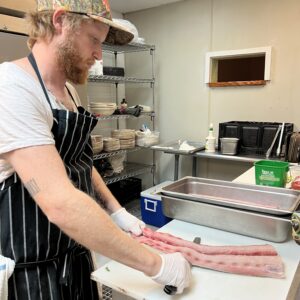
Chef Marcus Jacobs skins the Mahi prior to grilling it and topping it with a stellar crab fat gravy. Photo: Mara Welton
We talked about why seafood lovers should take ownership of their relationship to seafood, and learn more about why they should care where it comes from, again reinforcing Lance’s story about the impact of cheap imports. Folks learned the most important question they should ask is, “Where does this seafood come from?” We also talked about using the 7 Cs of Sustainable Seafood as a reference framework for their next seafood purchasing decision.
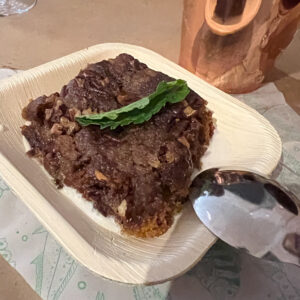
Magical Gateau de Sirop by Chef Christina do Carmo Honn. Photo: Mara Welton
The meal finished on an even higher note with a seemingly decadent (but not over-the-top unhealthy!) gateau de sirop (cane syrup cake) made with a variety of nuts and served with toasted pecans and coconut ice cream, prepared by Dana’s wife and Carmo co-owner Christina do Carmo Honn. She sprinkles magic on every dessert she makes.
The evening ended with gratitude for the chefs, the fishermen and the growing community vowing to support local seafood networks bolstered by businesses like Porgy’s Seafood Market.
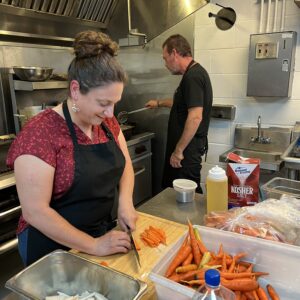
Chefs April Bellow and Dana Honn prepping for the feast. April was instrumental in planning the KNOW FISH Dinner and the Chefs Camp the day before. Photo: Mara Welton
In fact, this was the 9th Slow Fish Rising Tide event of 2023. As Slow Fish North America’s network coordinator, I have worked closely with Slow Food USA Programs Director Mara Welton and several fishermen, chefs, Slow Food chapter leaders, and other local seafood advocates to produce an array of successful events in five different communities. Whether a Seafood Throwdown during the Charleston Wine + Food festival, or a KNOW FISH Dinner at the University of Massachusetts, we continued to grow the community supporting seafood with values.
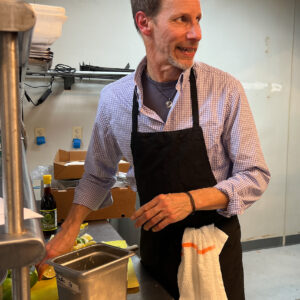
Sometimes you gotta don the apron and squeeze the limes. Photo: Mara Welton
Once again, we continue to move the needle, one conversation at a time.
More to come in 2024!
Top Photo: Mara Welton
¹This is an inclusive and gender-neutral term for us, and the one used most commonly among women who fish in our networks. It’s meant to refer to those who might also use the terms fish harvesters, fisherwomen, fishermisses, fishers, and intertidal gatherers, as well as those practicing restorative aquaculture on a sustainable scale.


